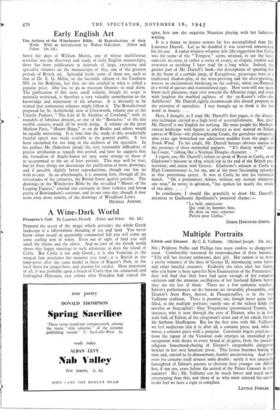Multiple Portraits
Edwin and Eleanor. By C. E. Vulliamy. (Michael Joseph. 12s. 6d.)
No; Polderoy Puffin and Philligo fans must confess to disappoint- ment. Comfortably reassured by reintroduction of their heroine: " Elly still has literary ambitions, dear girl. Her notion is to write a pretty romance of the days of George II, introducing some fairie and other fanciful creatures. Evidently she takes after her father, who you know is busy upon his New Examination of the Pentateuch," they will find that they have had quite enough of her romantic exercises and the amorous oscillations of her husband Edwin before they see the last of them. There are a few authentic touches: Edwin's performances on the bassoon are invariably pleasurable, and Eleanor's Aunt Rory, Aurora de Plouquenailles, is in the true Vulliamy tradition. Thera is promise, too, though never quite ful- filled, in the multiple portraits (surely one of the richest fields for novelist or biographer): Guy Trequharne (pronounced Trawn), for instance who is seen through the eyes of Eleanor, who is in love with him, of Edwin, of the clergyman's sister and of his rakish friend, Sir Anthony Shuffington. But for the first time with Mr. Vulliamy we feel suspicious that it is, after all, a costume piece, and, what is worse, a costume piece with a purpose. Constraint begets prurinice: from the rigour of the Victorian code emerges an intensified pre- occupation with desire in every brand of disguise, from the pseudo- religious housemaid-chasing of Eleanor's unspeakable clergyman brother to her own luxuriant prose. This lesson becomes boring in time and, carried•to its denouement, frankly unconvincing. And theft even the costume itself arouses some doubts : surely it was unusually foresighted of Edwin's parents to christen their younger son Albert five, if not ten, years before the arrival of the Prince Consort in this country? No; Mr. Vulliamy can be much better and much more entertaining than this, and those of us who most enjoyed his earlier books feel we have a right to complain.
LETTICE FOWLER. •






























 Previous page
Previous page